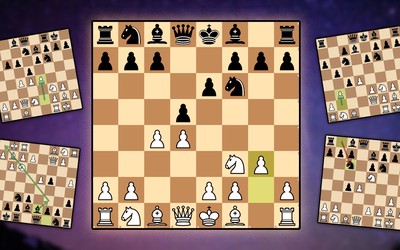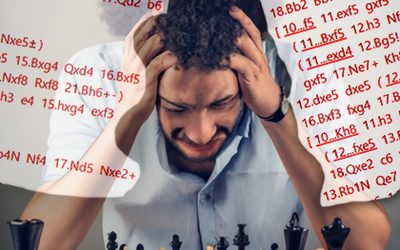
The Hidden Benefit of Calculation Training
It's Not What Most ExpectOne of my best tournaments I’ve ever played was the 2020 Japan Chess Classic.
I managed to win the tournament with a round to spare, and gain a whopping 70 ELO points.

However, this only came after what felt like endless stagnation and frustration; much of which was self-afflicted, simply due to a lack of willingness to confront the most glaring weakness in my play - calculation.

The Conquest
So, I had decided during my summer break of 2020 that I was going to do everything in my power to conquer this weakness.
Everyday for ~2 months, I had spent 1~2 hours doing intense calculation using the exercises from ‘Chess Calculation Training: Middlegame’ (a book I’ve mentioned as one of my top books that helped me reach my current level).

And as you already know, this training ultimately culminated in a very strong tournament performance.
However, in spite of this, none of my wins came from the sharp, double-edged struggles that you would expect.
All of my wins were from more strategic struggles, with seemingly minimal calculation involved.
Even so, I would still attribute this performance largely due to the work I did on my calculation.

This tournament was a real eye-opener, in that it made me realize that good calculation has a positive spillover effect into every other area of the game.
Very often to make a strong positional move work, you must calculate some basic lines to verify it.
Here is a great example from my R1 game of the Japan Chess Classic, where calculation prevented myself from falling into a nasty pitfall:

In this position, I was extremely tempted to play 21.Qd2, tripling heavy pieces on the d-file. Fortunately, I was able to sniff out that my opponent could play the very strong ...d5!!.

22.cxd5 would allow ...c4! when the rook on d3 is amusingly trapped. While 22.dxc5 Nxc5 wins the exchange, as 23.Rd4 runs into ...Nb3.
22.b3 is likely White’s best, but it is clear at this point that the momentum has shifted to Black’s hands.
So, I instead opted for 21.dxc5!?, after which White had a big positional advantage following ...Nxc5 22.R3d2, when Black’s camp is filled with weaknesses.

I went onto win the game without many troubles.
The Inevitability of Calculation
As much as I liked to believe I was a “positional player” growing up, and calculation was not of great importance to myself, my losses were depicting a very different story.
Whether you like it or not, there will almost always come a point in any given game where you will have to go in the tank and calculate out some lines.
This can be easy to forget, though.
If you were to have quickly played through the moves of the game I showed above, one could easily walk away under the (wrong) impression that I had “effortlessly” outplayed the opponent without any calculation.
This seemingly innocent assumption can have dire consequences, however.
If there is a perception that one can put in X amount of effort to achieve a particular desired outcome, it is unlikely they will bother doing more than X themselves.
Converting Advantages
One of the most common ways this perception screws players over is when it comes to converting a better position — as they believe that the win is inevitable, and things will naturally come together.
Any experienced player would tell you that this is complete BS, however.
It is not for no reason that former top-player and trainer GM Artur Yusupov said something along the lines of: “when you have a winning position, do not relax. Focus harder.”
One lapse in concentration and lack of attention to the concrete details in a position could undo 40+ moves of Karpov-like play — and likely when you least expect it.
Unfortunately, as much as I would like to sit here and lecture about this, there is a clear solution to all these problems:
Calculation.
More blog posts by RoadToInfinity

20 Ideas Every Catalan Player Must Know
A Comprehensive Guide To Understanding The Catalan Opening
The Minimum Viable (Opening) Repertoire
The Solution To The Amatuer's Opening Problems